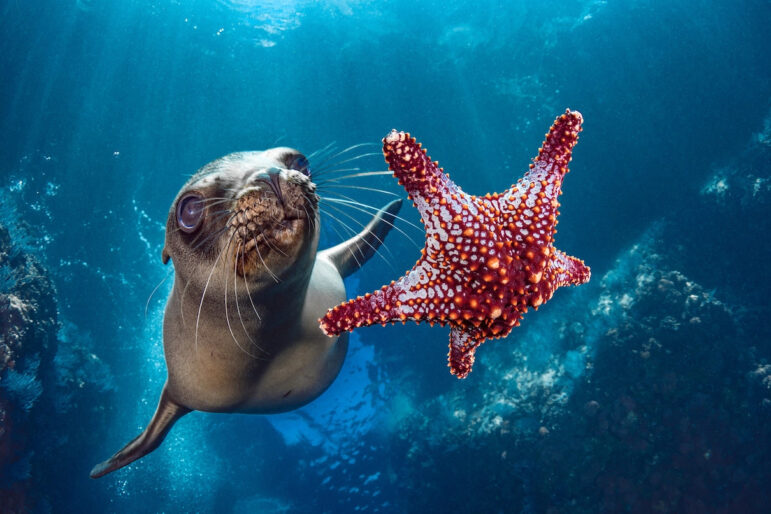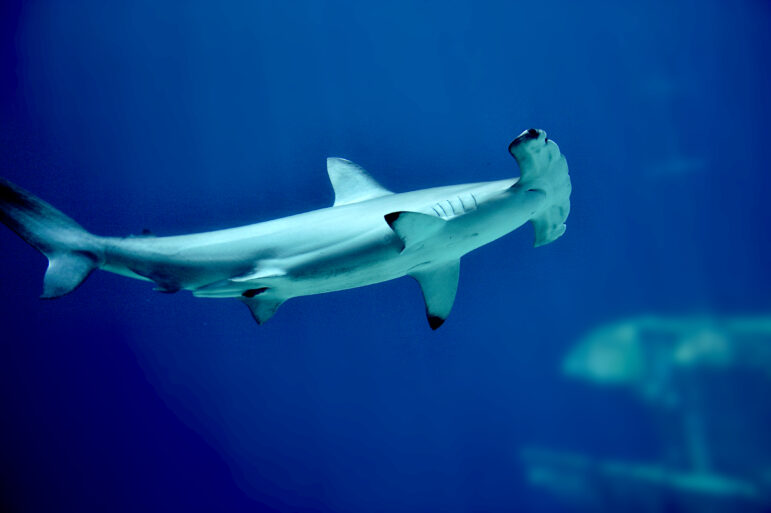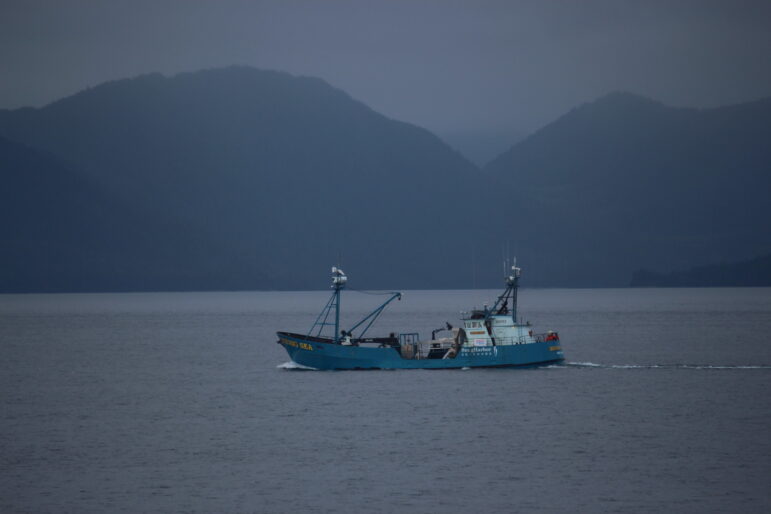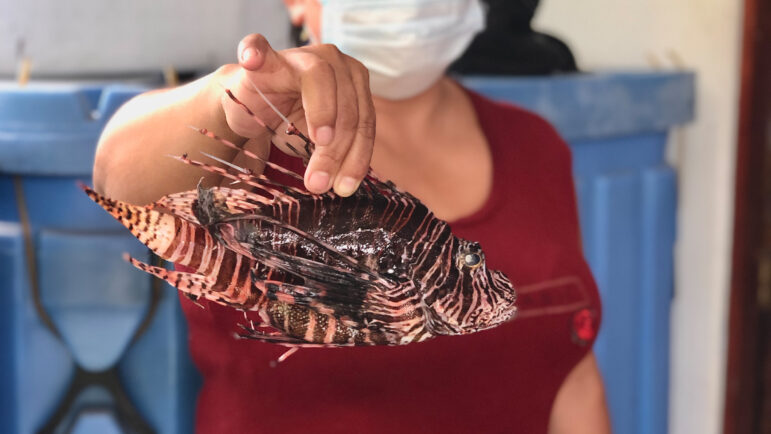
Sea lion with a starfish, La Paz. Image by Hannes Klostermann / Ocean Image Bank.
Throughout 2022, Mongabay meaningfully advanced transparency of the fishing industry and raised awareness of the environmental and social impacts of various practices. To do this, we produced new information that policymakers, businesses, communities, and consumers could use to make informed decisions and implement actions that help address the conditions under which the fishing sector negatively affects ocean health and the livelihoods of coastal communities.
Mongabay published original news, in-depth investigations, and insightful features, comprising hundreds of videos, articles, and podcast episodes. This global reporting effort spanned every continent, and the entire repository is available through our Oceans series.
Impacts
While generating change through journalism is often an indirect process that relies upon diverse actors to think, believe, and behave differently, we’ve already documented multiple real-world impacts related to the news produced.
Increased Awareness

Scalloped hammerhead. Image by ErikvanB via Wikimedia Commons (CC BY-SA 4.0).
Mongabay’s content has elevated public awareness of the fisheries sector’s problems, including certain types of gear, techniques, and labor abuse, as well as efforts to transform it into a more sustainable function of local and global food systems via policy, new research, resource management, and conservation. Mongabay’s coverage showcased diverse fisheries’ interconnectedness and global ripples, from snow crab and squid to salmon. It also spanned multiple geographies, including but not limited to Sierra Leone, Greenland, the United States, China, New Zealand, Thailand, Australia, Sri Lanka, India, and Brazil, in addition to several transboundary and international waters-centric stories.
Short-form, explainer videos, and webinars have expanded Mongabay’s reach, educating audiences on several topics. These videos include efforts to control invasive lionfish in Costa Rica, the status of krill populations in Antarctica, the closure of the snow crab fishery in the Bering Sea, and the positive impact of trawling bans on fish populations in southern Brazil. In addition, Mongabay produced two explainer videos that sought to educate audiences about the differences between industrial and artisanal fishing and another examining the controversial fishing method of bottom trawling. Furthermore, as part of Mongabay’s free webinar series for journalists, we hosted an oceans and fisheries webinar in late July, where we explored global impacts on oceans and the intersection of fisheries management, law, and regulations.
Improved Accountability and Transparency
A deckhand on the Long Xing 626 in Dalian Ocean Fishing’s Atlantic fleet displays what experts who reviewed the image identified as a blue shark in a photo posted to Facebook. The animal on the ground is a leatherback sea turtle.
A notable impact followed the November 2022 publication of an exclusive investigation into shark finning that directly informed the announcement of sanctions by the U.S. Treasury on December 9 and potentially contributed to the December 15 passage of new U.S. legislation banning shark finning that also includes provisions to address illegal, unreported and unregulated (IUU) fishing.
One of China’s largest tuna fishing firms, Dalian Ocean Fishing Co., Ltd. (DOF), was front and center of the report that exposed extensive illegal shark-finning operations within the DOF fleet of longline fishing vessels. That report reveals how the company uses banned fishing gear to deliberately catch sharks in international waters on such a massive scale that the shark catch for the entire country of China may have been undercounted for years. The article was republished or cited in the media, including Forbes, the Australian Broadcasting Corporation, CounterPunch, and Corpwatch.
The report engaged several civil society stakeholders who advocate for marine conservation. Notably, a staffer from World Wildlife Fund (WWF) reached out to express, “[t]he work that you guys do as journalists make my job so much more effective, especially when it is pieces like what you just wrote. There is no finer example of an exclamation point that can be put on the issue of shark finning and human/labor rights violations than what you wrote.” Civil society participants informed Mongabay that the report was discussed at the International Commission for the Conservation of Atlantic Tunas meeting in mid-November 2022.
While U.S. government action to sanction DOF is undoubtedly notable, Mongabay’s investigation into DOF’s supply chain found most of the company’s tuna catch was going to Japan’s Mitsubishi Corporation and its seafood trading arm, Toyo Reizo. The murky nature of the supply chain impeded tracing specific tuna flows from individual fishing boats to Mitsubishi’s supply chain. The company and Japan’s Fisheries Agency declined to disclose data to Mongabay when requested. Thus, Mongabay used data from Global Fishing Watch to identify probable transshipments between DOF vessels and Japan-bound reefer vessels, interviews with fishers on the boats, and draft documents for DOF’s unsuccessful 2014 attempt to go public on the Hong Kong Stock Exchange to document DOF’s relationship with Mitsubishi.
DOF was also the subject of the 2021 Mongabay investigation in collaboration with Tansa and the Environmental Reporting Collective, which uncovered widespread and systematic human rights abuse across the company’s fleet. Mongabay’s reporting included a Q&A with an Indonesian crew member abused on a Chinese shark-finning boat to describe his ordeal in his words. Interviews with crews were essential for Mongabay to estimate the number and weight of sharks captured by DOF boats due to data availability and integrity issues with all other publicly accessible sources. On a podcast, Mongabay’s senior editor for Southeast Asia Philip Jacobson, who led the investigation with Basten Gokkon, a senior Indonesia staff writer for Mongabay, explained their process.
Increased Dissemination of Information on Bottom Trawling

A fishing boat on the Bering Sea. Image by Joseph via Flickr (CC BY-NC-SA 2.0).
Mongabay’s reporting reached new heights by focusing on destructive fishing practices and the relationship between IUU fishing and bottom trawling in deep waters and coastal zones.
One of Mongabay’s most far-reaching articles of 2022 was a report explaining the factors influencing the National Oceanic and Atmospheric Administration to shut down the snow crab fishery for the first time in October 2022, following a population decline of 80% between 2018 and 2022. While fisheries managers and biologists say climate change is to blame for the species’ retreat, some fishers and crab experts suggest trawling bycatch and other fishing activity may have played a role in the snow crab’s decline. The fishery’s closure has amplified concerns about Alaska’s trawling industry and knowledge gaps around its potential impact on fisheries. The report was picked up by the McClatchy newspaper chain and published in The News Tribune, the Miami Herald, and the Charlotte Observer. The independent science news outlet, the Nautilus, also cited it.
Mongabay also sustained its focus on the importance of the seafloor by focusing on coastal solutions that benefit marine biodiversity and climate resilience. Examples include articles on the European Commission’s decision to protect 6,200 square miles of the deep sea from bottom fishing, Niue’s designation of its entire, exclusive economic zone — an area about the size of Vietnam — as a multiple-use marine park; Comoros’ creation of three new marine protected areas, and the recent decision by the Western and Central Pacific Fisheries Commission to outlaw shark lines and wire leaders, both of which aid industrial-scale fishers in targeting sharks.
Indigenous Peoples and Local Communities

The invasive lionfish caught in Costa Rican waters. Image by Alfredo Torres.
Mongabay highlighted the critical role Indigenous peoples and local communities (IPLCs) play in achieving the 30×30 target in the world’s oceans. For instance, one of the most well-read articles highlights a grassroots collaborative effort to stop the spread of the invasive red lionfish along Costa Rica’s southern Caribbean coast. Despite a freeze on fishing licenses since 2005, artisanal fishers quickly responded to the growing problem of controlling the invasion. In 2011, the Southern Caribbean Artisanal Fishers’ Association (APACS) was formed to teach other locals to hunt lionfish. Since then, the association has attracted attention from the Costa Rican government and won grants to expand its efforts, including educational campaigns from the United Nations Development Programme’s Small Project Fund and the Washington, D.C.-based Inter-American Foundation.
An article from eastern Canada also reported on efforts to resolve Indigenous and settler conflict over marine resources, incorporating Indigenous traditional knowledge in a manner that is neither tokenized nor romanticized. In 2020, when an Indigenous Mi’kmaq community launched a livelihood lobster fishery outside the commercial season—a fishery to which a 1999 Supreme Court of Canada decision affirmed Indigenous communities have a right—it sparked resistance, at times violent, from non-native commercial fishers who recognized concerns with the conservation of the stock. The article calls attention to a research project collaborating with the Mi’kmaq community and local settler fishers to generate information on sustainable fisheries management. The project is becoming a platform to rebuild relationships between Indigenous and local settler communities. Hakai Magazine, a notable environmental and coastal news outlet, republished the piece.
Future Reporting on Oceans and Bottom Trawling
Oceans and fisheries reporting will remain a critical part of Mongabay’s editorial effort. We’ll continue its focus on oceans and bottom trawling, investigating the environmental and social impacts of the fishing industry and highlighting innovative solutions for sustainable fisheries management.
Support Independent Environmental Journalism
If you are interested in helping sustain independent news, there are two excellent ways you can do so with Mongabay. First, consider making a donation, which directly helps us continue to produce high-impact journalism from Nature’s frontline. Second, subscribe to Mongabay’s newsletter to get the latest environmental news delivered right to your inbox.
About Mongabay
Mongabay is a nonprofit environmental science and conservation news platform focused on providing cutting-edge independent journalism from Nature’s frontline. We pride ourselves on producing reporting that has substantial, tangible impacts around the world.